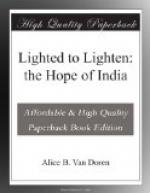“In national and international questions also women can take a part. Women are more conservative, sympathetic, and kind than men. Great changes and misery which are not foreseen at all are brought by wars between different countries. Women, too, can consider about the affairs of wars as well as men. Their sympathetic and conservative views will help the people not to plunge into needless wars and political complications.
“Women know as well as, and perhaps more than men, the evils which result from the illiteracy of people and their unsanitary conditions. Men spend much of their time outside home, while women in their quiet homes can see their surroundings and watch the needs of people around them. So women can give good ideas in matters concerning education and sanitation. In this way, women can influence the public opinion of a place and the government of a country depends much on the nature of public opinion.”
But with all these “new woman theories” the claims of home are not forgotten:
“Among the many possibilities opening out to women, we cannot fail to mention home life, though it is nothing new.
“According to the testimony of all history, the worth and blessing of men and nations depend in large measure on the character and ordering of family life. ’The family is the structural cell of the social organism. In it lives the power of propagation and renewal of life. It is the foundation of morality, the chief educational institution, and the source of nearly all real contentment among men.’ All other questions sink into insignificance when the stability of the family is at stake. In short, the family circle is a world in miniature, with its own habits, its own interests, and its own ties, largely independent of the great world that lies outside. When the family is of such great importance, how much greater should be the responsibilities of women in the ordering of that life? Is it not there in the home that we develop most of our habits, our lines of thought and action?
“Even while keeping home, woman can do other kinds of work. She can help her husband in his varied activities by showing interest and sympathy in all that he does; she can influence him in every possible way. Then also she may do social and religious work, and even teaching, though she has to manage a home. But the work that needs her keenest attention is in the home itself, in training up the children. Happiness and cheerfulness in the home circle depend more or less on the radiant face of the mother, as she performs her simple tasks, upon her tenderness, on her unwearied willingness to surpass all boundaries in love. She is the ‘centre’ of the family. The physical and moral training of her children falls to her lot.
“Now, the developing of character is no light task, nor is it the least work that has to be done. The family exists to train individuals for membership in a large group. In the little family circle attention can be concentrated on a few who in turn can go out and influence others. The family, therefore, is the nursery of all human virtues and powers.




